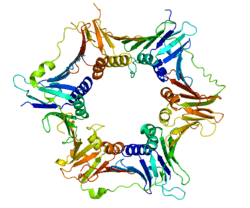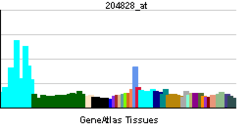RAD9A
| View/Edit Human | View/Edit Mouse |
Cell cycle checkpoint control protein RAD9A is a protein that in humans is encoded by the RAD9A gene.[3]
Function
This gene product is highly similar to Schizosaccharomyces pombe rad9, a cell cycle checkpoint protein required for cell cycle arrest and DNA damage repair in response to DNA damage. This protein is found to possess 3' to 5' exonuclease activity, which may contribute to its role in sensing and repairing DNA damage. It forms a checkpoint protein complex with RAD1 and HUS1. This complex is recruited by checkpoint protein RAD17 to the sites of DNA damage, which is thought to be important for triggering the checkpoint-signaling cascade. Use of alternative polyA sites has been noted for this gene.[4]
Interactions
RAD9A has been shown to interact with:
References
- ↑ "Human PubMed Reference:".
- ↑ "Mouse PubMed Reference:".
- ↑ Lieberman HB, Hopkins KM, Nass M, Demetrick D, Davey S (January 1997). "A human homolog of the Schizosaccharomyces pombe rad9+ checkpoint control gene". Proc Natl Acad Sci U S A. 93 (24): 13890–5. doi:10.1073/pnas.93.24.13890. PMC 19459
 . PMID 8943031.
. PMID 8943031. - ↑ "Entrez Gene: RAD9A RAD9 homolog A (S. pombe)".
- ↑ Yoshida K, Komatsu K, Wang HG, Kufe D (May 2002). "c-Abl tyrosine kinase regulates the human Rad9 checkpoint protein in response to DNA damage". Mol. Cell. Biol. 22 (10): 3292–300. doi:10.1128/mcb.22.10.3292-3300.2002. PMC 133797
 . PMID 11971963.
. PMID 11971963. - ↑ Wang L, Hsu CL, Ni J, Wang PH, Yeh S, Keng P, Chang C (March 2004). "Human checkpoint protein hRad9 functions as a negative coregulator to repress androgen receptor transactivation in prostate cancer cells". Mol. Cell. Biol. 24 (5): 2202–13. doi:10.1128/mcb.24.5.2202-2213.2004. PMC 350564
 . PMID 14966297.
. PMID 14966297. - ↑ Rual JF, Venkatesan K, Hao T, Hirozane-Kishikawa T, Dricot A, Li N, Berriz GF, Gibbons FD, Dreze M, Ayivi-Guedehoussou N, Klitgord N, Simon C, Boxem M, Milstein S, Rosenberg J, Goldberg DS, Zhang LV, Wong SL, Franklin G, Li S, Albala JS, Lim J, Fraughton C, Llamosas E, Cevik S, Bex C, Lamesch P, Sikorski RS, Vandenhaute J, Zoghbi HY, Smolyar A, Bosak S, Sequerra R, Doucette-Stamm L, Cusick ME, Hill DE, Roth FP, Vidal M (October 2005). "Towards a proteome-scale map of the human protein-protein interaction network". Nature. 437 (7062): 1173–8. doi:10.1038/nature04209. PMID 16189514.
- 1 2 Komatsu K, Miyashita T, Hang H, Hopkins KM, Zheng W, Cuddeback S, Yamada M, Lieberman HB, Wang HG (January 2000). "Human homologue of S. pombe Rad9 interacts with BCL-2/BCL-xL and promotes apoptosis". Nat. Cell Biol. 2 (1): 1–6. doi:10.1038/71316. PMID 10620799.
- ↑ Xiang SL, Kumano T, Iwasaki SI, Sun X, Yoshioka K, Yamamoto KC (October 2001). "The J domain of Tpr2 regulates its interaction with the proapoptotic and cell-cycle checkpoint protein, Rad9". Biochem. Biophys. Res. Commun. 287 (4): 932–40. doi:10.1006/bbrc.2001.5685. PMID 11573955.
- ↑ Cai RL, Yan-Neale Y, Cueto MA, Xu H, Cohen D (September 2000). "HDAC1, a histone deacetylase, forms a complex with Hus1 and Rad9, two G2/M checkpoint Rad proteins". J. Biol. Chem. 275 (36): 27909–16. doi:10.1074/jbc.M000168200. PMID 10846170.
- 1 2 3 Dufault VM, Oestreich AJ, Vroman BT, Karnitz LM (Dec 2003). "Identification and characterization of RAD9B, a paralog of the RAD9 checkpoint gene". Genomics. 82 (6): 644–51. doi:10.1016/s0888-7543(03)00200-3. PMID 14611806.
- 1 2 Volkmer E, Karnitz LM (January 1999). "Human homologs of Schizosaccharomyces pombe rad1, hus1, and rad9 form a DNA damage-responsive protein complex". J. Biol. Chem. 274 (2): 567–70. doi:10.1074/jbc.274.2.567. PMID 9872989.
- 1 2 Griffith JD, Lindsey-Boltz LA, Sancar A (May 2002). "Structures of the human Rad17-replication factor C and checkpoint Rad 9-1-1 complexes visualized by glycerol spray/low voltage microscopy". J. Biol. Chem. 277 (18): 15233–6. doi:10.1074/jbc.C200129200. PMID 11907025.
- 1 2 Hirai I, Wang HG (July 2002). "A role of the C-terminal region of human Rad9 (hRad9) in nuclear transport of the hRad9 checkpoint complex". J. Biol. Chem. 277 (28): 25722–7. doi:10.1074/jbc.M203079200. PMID 11994305.
- 1 2 Lindsey-Boltz LA, Bermudez VP, Hurwitz J, Sancar A (September 2001). "Purification and characterization of human DNA damage checkpoint Rad complexes". Proc. Natl. Acad. Sci. U.S.A. 98 (20): 11236–41. doi:10.1073/pnas.201373498. PMC 58713
 . PMID 11572977.
. PMID 11572977. - ↑ Bermudez VP, Lindsey-Boltz LA, Cesare AJ, Maniwa Y, Griffith JD, Hurwitz J, Sancar A (February 2003). "Loading of the human 9-1-1 checkpoint complex onto DNA by the checkpoint clamp loader hRad17-replication factor C complex in vitro". Proc. Natl. Acad. Sci. U.S.A. 100 (4): 1633–8. doi:10.1073/pnas.0437927100. PMC 149884
 . PMID 12578958.
. PMID 12578958. - ↑ Rauen M, Burtelow MA, Dufault VM, Karnitz LM (September 2000). "The human checkpoint protein hRad17 interacts with the PCNA-like proteins hRad1, hHus1, and hRad9". J. Biol. Chem. 275 (38): 29767–71. doi:10.1074/jbc.M005782200. PMID 10884395.
- ↑ Mäkiniemi M, Hillukkala T, Tuusa J, Reini K, Vaara M, Huang D, Pospiech H, Majuri I, Westerling T, Mäkelä TP, Syväoja JE (August 2001). "BRCT domain-containing protein TopBP1 functions in DNA replication and damage response". J. Biol. Chem. 276 (32): 30399–406. doi:10.1074/jbc.M102245200. PMID 11395493.
Further reading
- Lieberman HB (2006). "Rad9, an evolutionarily conserved gene with multiple functions for preserving genomic integrity". J. Cell. Biochem. 97 (4): 690–7. doi:10.1002/jcb.20759. PMID 16365875.
- Volkmer E, Karnitz LM (1999). "Human homologs of Schizosaccharomyces pombe rad1, hus1, and rad9 form a DNA damage-responsive protein complex". J. Biol. Chem. 274 (2): 567–70. doi:10.1074/jbc.274.2.567. PMID 9872989.
- St Onge RP, Udell CM, Casselman R, Davey S (1999). "The Human G2 Checkpoint Control Protein hRAD9 Is a Nuclear Phosphoprotein That Forms Complexes with hRAD1 and hHUS1". Mol. Biol. Cell. 10 (6): 1985–95. doi:10.1091/mbc.10.6.1985. PMC 25401
 . PMID 10359610.
. PMID 10359610. - Komatsu K, Miyashita T, Hang H, Hopkins KM, Zheng W, Cuddeback S, Yamada M, Lieberman HB, Wang HG (2000). "Human homologue of S. pombe Rad9 interacts with BCL-2/BCL-xL and promotes apoptosis". Nat. Cell Biol. 2 (1): 1–6. doi:10.1038/71316. PMID 10620799.
- Bessho T, Sancar A (2000). "Human DNA damage checkpoint protein hRAD9 is a 3' to 5' exonuclease". J. Biol. Chem. 275 (11): 7451–4. doi:10.1074/jbc.275.11.7451. PMID 10713044.
- Hang H, Lieberman HB (2000). "Physical interactions among human checkpoint control proteins HUS1p, RAD1p, and RAD9p, and implications for the regulation of cell cycle progression". Genomics. 65 (1): 24–33. doi:10.1006/geno.2000.6142. PMID 10777662.
- Cai RL, Yan-Neale Y, Cueto MA, Xu H, Cohen D (2000). "HDAC1, a histone deacetylase, forms a complex with Hus1 and Rad9, two G2/M checkpoint Rad proteins". J. Biol. Chem. 275 (36): 27909–16. doi:10.1074/jbc.M000168200. PMID 10846170.
- Burtelow MA, Kaufmann SH, Karnitz LM (2000). "Retention of the human Rad9 checkpoint complex in extraction-resistant nuclear complexes after DNA damage". J. Biol. Chem. 275 (34): 26343–8. doi:10.1074/jbc.M001244200. PMID 10852904.
- Rauen M, Burtelow MA, Dufault VM, Karnitz LM (2000). "The human checkpoint protein hRad17 interacts with the PCNA-like proteins hRad1, hHus1, and hRad9". J. Biol. Chem. 275 (38): 29767–71. doi:10.1074/jbc.M005782200. PMID 10884395.
- Komatsu K, Wharton W, Hang H, Wu C, Singh S, Lieberman HB, Pledger WJ, Wang HG (2000). "PCNA interacts with hHus1/hRad9 in response to DNA damage and replication inhibition". Oncogene. 19 (46): 5291–7. doi:10.1038/sj.onc.1203901. PMID 11077446.
- Chen MJ, Lin YT, Lieberman HB, Chen G, Lee EY (2001). "ATM-dependent phosphorylation of human Rad9 is required for ionizing radiation-induced checkpoint activation". J. Biol. Chem. 276 (19): 16580–6. doi:10.1074/jbc.M008871200. PMID 11278446.
- Burtelow MA, Roos-Mattjus PM, Rauen M, Babendure JR, Karnitz LM (2001). "Reconstitution and molecular analysis of the hRad9-hHus1-hRad1 (9-1-1) DNA damage responsive checkpoint complex". J. Biol. Chem. 276 (28): 25903–9. doi:10.1074/jbc.M102946200. PMID 11340080.
- Mäkiniemi M, Hillukkala T, Tuusa J, Reini K, Vaara M, Huang D, Pospiech H, Majuri I, Westerling T, Mäkelä TP, Syväoja JE (2001). "BRCT domain-containing protein TopBP1 functions in DNA replication and damage response". J. Biol. Chem. 276 (32): 30399–406. doi:10.1074/jbc.M102245200. PMID 11395493.
- St Onge RP, Besley BD, Park M, Casselman R, Davey S (2001). "DNA damage-dependent and -independent phosphorylation of the hRad9 checkpoint protein". J. Biol. Chem. 276 (45): 41898–905. doi:10.1074/jbc.M105152200. PMID 11551919.
- Xiang SL, Kumano T, Iwasaki SI, Sun X, Yoshioka K, Yamamoto KC (2001). "The J domain of Tpr2 regulates its interaction with the proapoptotic and cell-cycle checkpoint protein, Rad9". Biochem. Biophys. Res. Commun. 287 (4): 932–40. doi:10.1006/bbrc.2001.5685. PMID 11573955.
- Zou L, Cortez D, Elledge SJ (2002). "Regulation of ATR substrate selection by Rad17-dependent loading of Rad9 complexes onto chromatin". Genes Dev. 16 (2): 198–208. doi:10.1101/gad.950302. PMC 155323
 . PMID 11799063.
. PMID 11799063. - Griffith JD, Lindsey-Boltz LA, Sancar A (2002). "Structures of the human Rad17-replication factor C and checkpoint Rad 9-1-1 complexes visualized by glycerol spray/low voltage microscopy". J. Biol. Chem. 277 (18): 15233–6. doi:10.1074/jbc.C200129200. PMID 11907025.
- Hang H, Zhang Y, Dunbrack RL, Wang C, Lieberman HB (2002). "Identification and characterization of a paralog of human cell cycle checkpoint gene HUS1". Genomics. 79 (4): 487–92. doi:10.1006/geno.2002.6737. PMID 11944979.
- Yoshida K, Komatsu K, Wang HG, Kufe D (2002). "c-Abl Tyrosine Kinase Regulates the Human Rad9 Checkpoint Protein in Response to DNA Damage". Mol. Cell. Biol. 22 (10): 3292–300. doi:10.1128/MCB.22.10.3292-3300.2002. PMC 133797
 . PMID 11971963.
. PMID 11971963.
This article is issued from Wikipedia - version of the 5/20/2016. The text is available under the Creative Commons Attribution/Share Alike but additional terms may apply for the media files.

